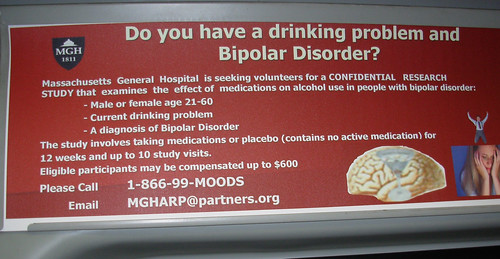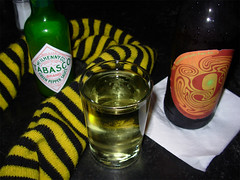
(clinical trial advertisement in boston subway car)
Do you have not one, but two separate problems that are associated with making bad decisions? If so, why don't you choose to have a 50% chance of forgoing treatment for both for three months, in exchange for $600? If you don't have good social support, you've probably lost enough in one way or another from the costs of bad behavior resulting from these problems that $600 is maybe enough to get you to go for it, especially since you don't have prudent people around you to talk you out of it.
Don't worry: you can rest assured you'll be in the most capable, professional hands -- just look at the quality of our graphic design! Yes, that's a picture of a human brain we got off the web, with a martini glass superimposed on top of it. And, see, there's a photo of an anguished woman, just below a photo of a cartoon man so excited he's raising his arms with glee (if you didn't know: in bipolar disorders, it's common for people to switch not only from very low to very high moods, but also from female to male, from actual to cartoon, and from normal size to being only three inches tall).
I'm tempted to call the number and see what their screening procedure is like. I would love to see an ethnographic investigation of clinical trials.
BTW, on the science front, I made my first trip the other night to the famous Miracle of Science Bar and Grill near MIT's campus. I was expecting there to be more science. Sure, the chalkboard menu was arranged like a periodic table, and the tables and stools were like those from a chemistry lab, but apart from some radio equipment sitting above the bottles of alcohol there really wasn't much science in there. I have more science toys-y stuff in my Madison office. The patrons also looked sadly ungeeky; I was expecting to feel some deep geekinship. The bar did, at least, serve it's drinks up in beakers:

5 comments:
In re: ethnographies of clinical trials: Jennifer Fosket (at McGill) did an ethnography of the STAR trial (Study of Tamoxifen and Raloxifene) and Stefan Timmermans (at UCLA) is now working on one, I think for a drug for mental illness, though I don't remember the specific drug/condition under study. They both do great work.
In re: Miracle of Science: Cómo decepciona! I hope you managed to have a good night, despite the disillusionment and absence of geek affiliative bonding...
i'm surprised M.O.S. wasn't geekier. i've heard it affectionately described as the ultimate in 'geek chic'.
In addition to rps's suggestions: Jackie Orr did some ethnographic work as a participant in a Xanax trial. http://www.amazon.com/Panic-Diaries-Genealogy-Disorder/dp/0822336235
In case the amazon url was truncated above.
Whenever I think of "miracle of science," I always think of childbirth. That would make a pretty cool bar, I think.
Post a Comment